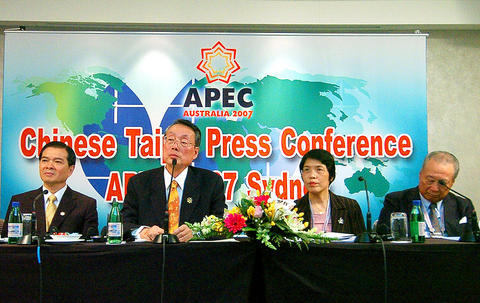Stan Shih (
"Taiwan and China have intensive exchanges in trade, culture and education," Shih said during a press conference after arriving in Sydney.
Shih, who arrived yesterday afternoon, was given a red carpet welcome and received by Australian Parliamentary Secretary for Foreign Affairs Greg Hunt at the airport.

PHOTO: WANG MIN-WEI, TAIPEI TIMES
"We should sit down and express our good will ... We don't want to see tense relations between the two sides," Shih said.
That's the message Shih said he would like to convey to Hu when they meet, as well as a response to what Hu said about the situation across the Taiwan Strait.
Hu said in a meeting on Thursday with US President George W. Bush that this year and next year will be "a highly dangerous period for the two sides of Taiwan Strait."
Hu also said that Washington sides with Beijing in opposing any changes to the "status quo."
Tensions between Taiwan and China have risen in the wake of the ruling and opposition parties' push for separate referendums on Taiwan's application for membership in the UN.
"As Taiwanese media have stressed, Taiwan is an independent country, and the push to apply for membership in UN through a referendum is a democratic exercise," Shih said.
In Sydney, a quarter-page ad placed by Taiwanese-Australian communities urging the Canberra government to support Taiwan's UN referendum bid appeared in the Australian, the nation's largest newspaper.
"We, representing various Taiwanese communities in Australia, urge the Australian government, as one of the most advanced democracies in the world, to support Taiwan's legitimate case," the ad sponsored by former presidential adviser Chiou Chwei-liang (邱垂亮), the Taiwan Institute in Australia and the Australian Federation of Taiwanese Associations.
Shih will meet leaders from APEC members, including Hu, during the two-day summit that starts today. He will also share the same table with leaders and business representatives from Canada, Singapore, Russia and Australia during the "ABAC Dialogue with Leaders" today.
"I will put all my efforts into promoting interaction with leaders from other member countries to deliver Taiwan's message of good will and commitment to APEC," Shih said.
With information technology as his specialty, Shih said he would invite the US, Japan, South Korea and non-governmental organizations to promote the Digital Opportunity Center 2.0 project, which Taiwan proposed in 2003 to bridge the digital divide in some developing member countries.
Shih also delivered Chen's message that Taiwan would fully support the theme of this year's APEC meeting in fighting climate change with the "Green APEC Opportunity Initiative."
Shih said that, as a consultant to the Taiwan Electrical and Electronic Manufacturers' Association (電電公會), he would encourage member companies to apply green technology in production.
Susan Wang (

IN THE AIR: While most companies said they were committed to North American operations, some added that production and costs would depend on the outcome of a US trade probe Leading local contract electronics makers Wistron Corp (緯創), Quanta Computer Inc (廣達), Inventec Corp (英業達) and Compal Electronics Inc (仁寶) are to maintain their North American expansion plans, despite Washington’s 20 percent tariff on Taiwanese goods. Wistron said it has long maintained a presence in the US, while distributing production across Taiwan, North America, Southeast Asia and Europe. The company is in talks with customers to align capacity with their site preferences, a company official told the Taipei Times by telephone on Friday. The company is still in talks with clients over who would bear the tariff costs, with the outcome pending further

NEGOTIATIONS: Semiconductors play an outsized role in Taiwan’s industrial and economic development and are a major driver of the Taiwan-US trade imbalance With US President Donald Trump threatening to impose tariffs on semiconductors, Taiwan is expected to face a significant challenge, as information and communications technology (ICT) products account for more than 70 percent of its exports to the US, Chung-Hua Institution for Economic Research (CIER, 中華經濟研究院) president Lien Hsien-ming (連賢明) said on Friday. Compared with other countries, semiconductors play a disproportionately large role in Taiwan’s industrial and economic development, Lien said. As the sixth-largest contributor to the US trade deficit, Taiwan recorded a US$73.9 billion trade surplus with the US last year — up from US$47.8 billion in 2023 — driven by strong

A proposed 100 percent tariff on chip imports announced by US President Donald Trump could shift more of Taiwan’s semiconductor production overseas, a Taiwan Institute of Economic Research (TIER) researcher said yesterday. Trump’s tariff policy will accelerate the global semiconductor industry’s pace to establish roots in the US, leading to higher supply chain costs and ultimately raising prices of consumer electronics and creating uncertainty for future market demand, Arisa Liu (劉佩真) at the institute’s Taiwan Industry Economics Database said in a telephone interview. Trump’s move signals his intention to "restore the glory of the US semiconductor industry," Liu noted, saying that

AI: Softbank’s stake increases in Nvidia and TSMC reflect Masayoshi Son’s effort to gain a foothold in key nodes of the AI value chain, from chip design to data infrastructure Softbank Group Corp is building up stakes in Nvidia Corp and Taiwan Semiconductor Manufacturing Co (TSMC, 台積電), the latest reflection of founder Masayoshi Son’s focus on the tools and hardware underpinning artificial intelligence (AI). The Japanese technology investor raised its stake in Nvidia to about US$3 billion by the end of March, up from US$1 billion in the prior quarter, regulatory filings showed. It bought about US$330 million worth of TSMC shares and US$170 million in Oracle Corp, they showed. Softbank’s signature Vision Fund has also monetized almost US$2 billion of public and private assets in the first half of this year,